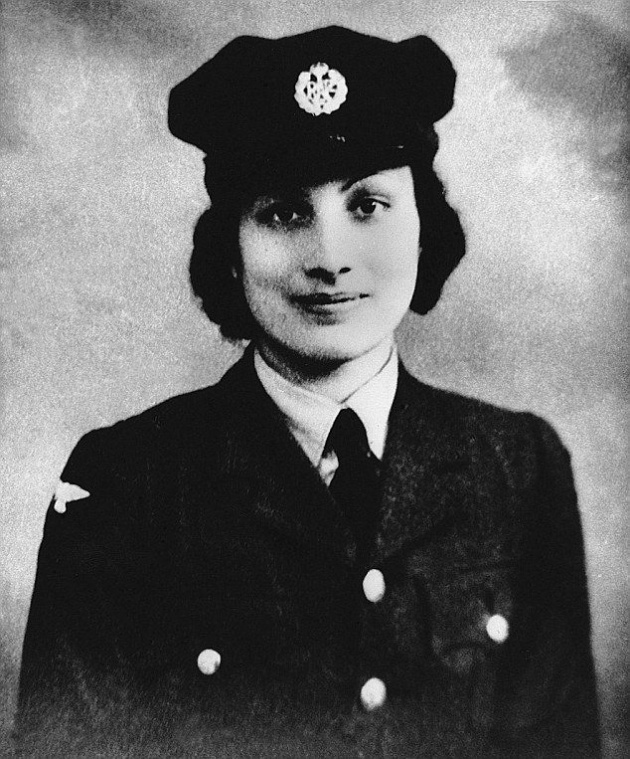
"She was a real war hero. It was quite unusual for women to do dangerous missions. But Noor went on a dangerous mission fearlessly for her love for Britain. The gun is important as it reminds us of the war that was secret," Czyzyk said.
The year 2014 has seen a massive increase in interest in the life story of the Indian princess.
The Royal Mail celebrated recently brought out selection of remarkable individuals from the realms of sport, design, economics, heroism and the arts with the "Remarkable Lives" stamp issue.

Noor Inayat Khan's pistol.
The set, available from March 25 commemorates individuals whose centenaries of birth fall in 2014 and who have all made a major contribution to British society. One of the stamps is on Noor.
Noor was born in Moscow in 1914 to an Indian father and an American mother. She began a career as a children's writer but Noor fled from Paris to Britain after the occupation of France in 1940. She served with the WAAFs (Women's Auxiliary Air Force) under the name of Nora Baker until February 1943, when she applied to join the SOE.
Noor was the first female wireless operator sent into France by the SOE. She landed in France in June 1943 and worked for a resistance network in Paris, under the code name Madeleine.
She survived a wave of arrests among her SOE contacts but declined a chance to return to Britain. She was betrayed and captured by the Gestapo (Nazi political police) in October 1943, but resisted interrogation and gave no information away.
After two failed escape attempts from prison, Noor was sent to Dachau concentration camp, where she was executed on 13 September 1944. In 1949, Noor was posthumously awarded the George Cross, which is the non-combatant equivalent of the Victoria Cross — the highest honour a civilian can receive in wartime.
It is rare — Noor was awarded military honours by France and Britain — the Croix De Guerre and the George Cross, an expert said.
British Prime Minister David Cameron recently said, "It is impossible not to be moved deeply by Noor Inayat Khan's bravery in the face of capture, interrogation, and harsh imprisonment, and by her cruel death met with indomitable courage. The award of the George Cross, our highest civilian decoration, gave recognition to her heroism."
The year 2014 has seen a massive increase in interest in the life story of the Indian princess.
The Royal Mail celebrated recently brought out selection of remarkable individuals from the realms of sport, design, economics, heroism and the arts with the "Remarkable Lives" stamp issue.

Noor Inayat Khan's pistol.
The set, available from March 25 commemorates individuals whose centenaries of birth fall in 2014 and who have all made a major contribution to British society. One of the stamps is on Noor.
Noor was born in Moscow in 1914 to an Indian father and an American mother. She began a career as a children's writer but Noor fled from Paris to Britain after the occupation of France in 1940. She served with the WAAFs (Women's Auxiliary Air Force) under the name of Nora Baker until February 1943, when she applied to join the SOE.
Noor was the first female wireless operator sent into France by the SOE. She landed in France in June 1943 and worked for a resistance network in Paris, under the code name Madeleine.
She survived a wave of arrests among her SOE contacts but declined a chance to return to Britain. She was betrayed and captured by the Gestapo (Nazi political police) in October 1943, but resisted interrogation and gave no information away.
After two failed escape attempts from prison, Noor was sent to Dachau concentration camp, where she was executed on 13 September 1944. In 1949, Noor was posthumously awarded the George Cross, which is the non-combatant equivalent of the Victoria Cross — the highest honour a civilian can receive in wartime.
It is rare — Noor was awarded military honours by France and Britain — the Croix De Guerre and the George Cross, an expert said.
British Prime Minister David Cameron recently said, "It is impossible not to be moved deeply by Noor Inayat Khan's bravery in the face of capture, interrogation, and harsh imprisonment, and by her cruel death met with indomitable courage. The award of the George Cross, our highest civilian decoration, gave recognition to her heroism."
Stay updated on the go with The Times of India’s mobile apps. Click here to download it for your device.



